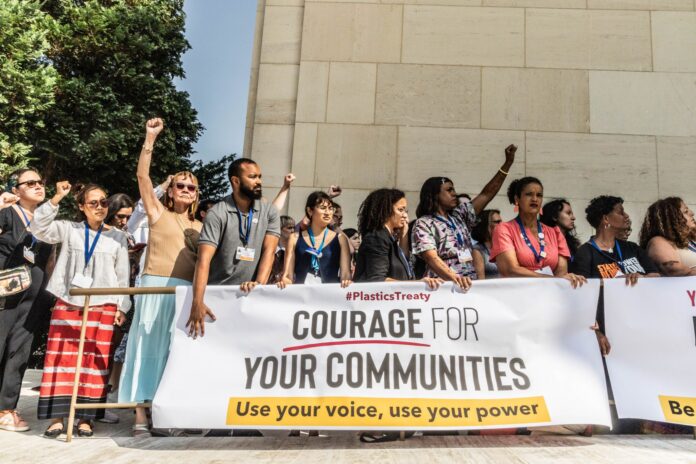
Hours before the plastic treaty negotiations (INC 5.2) in Geneva were to come to a close, controversy out broke with countries and civil society rejecting the latest proposed text of Luis Vayas Valdivieso, Chair of the Intergovernmental Negotiating Committee on Plastic Pollution, as an unacceptable basis for further negotiations. The text, they said, focuses on addressing the plastic problem as a waste management issue rather than reducing production and removing chemicals of concern.
The new text, the activists said in a statement, represents the lowest common denominator, “catering to petro-states and the fossil fuel industry instead of the vast majority of aligned countries– and most notably excludes the article on reducing plastic production, flouting the treaty mandate to address the full life-cycle of plastic.”
According to inputs Packaging South Asia has been receiving from sources in Geneva, the following ambitious measures with strong international support were cut from the Chair’s text, among others – Over 100 countries support plastic production cuts; Over 100 countries support a binding product and harmful chemicals phaseouts; almost 130 countries support a dedicated article on health; over 150 countries support a strong financial mechanism.
India, while acknowledging the problem of plastic pollution, has, however, been against any cut in primary polymer production and siding with the like-minded oil-producing countries such as Kuwait and Saudi Arabia, who are opposing upstream measures to tackle the issue. India has reportedly accepted the present draft as a ‘starting point’ for further talks.
A record 234 fossil fuel and chemical industry lobbyists registered for this round of plastics treaty negotiations, according to an analysis by Center for International Environmental Law. These lobbyists outnumber the combined delegations of all 27 European Union countries and the European Commission, with major companies such as Dow and ExxonMobil heavily represented.
GAIA, a worldwide alliance of more than 1,000 grassroots groups, non-governmental organizations, and individuals in over 90 countries, said in a statement, “This new text is sending a clear message to the world: we do not care about your health. We do not care about the science. We do not care about human rights. We do not care about your future. We only care about consensus. It ignores the will of the vast majority of member states and caters to the wishlist of the petro-states and the fossil fuel industry. To the Global South especially, which has worked hard to fight for environmental justice, this text is an insult.”
Article 6 on reducing plastic production, which science tells us is the most critical way to solve plastic pollution and has the support of over 100 member states, has been dropped, GAIA said. It said the objective to “end plastic pollution” has been left out of the text completely, and instead this has become a weak, waste management treaty.
“There is no reference to chemicals in plastic products, transparency, toxic-free reuse systems, the waste hierarchy, and the protection of human health, weakens provisions on Just Transition and a financial mechanism, and the list goes on. GAIA calls on Member States — use your voice, use your power. For the sake of humanity and future generations, reject the text.”
Ana Rocha, GAIA Global Plastics policy lead stated, “This new text sends a clear message to the world: we do not care about your health. We do not care about the science. We do not care about human rights. We do not care about your future. We only care about consensus.”
Joan Arc Simon, founder, Zero Waste Europe, expressed his frustration in a LinkedIn post. He said the text on the negotiation table that the chairman presented is deeply flawed. “Not because it lacks all ambition and doesn’t deliver the mandate by the hashtag#UNEA declaration – which it does – but because after hundreds of hours of negotiations we can finally see how a compromise solution would look like.”
The proposal, Break Free From Plastic, said, lacks the most important provisions that ambitious countries, Indigenous Peoples, frontline communities, scientists and civil society groups have been demanding since the beginning of this process.
“There is no mention of the words ‘chemicals’ or ‘reuse systems,’ no inclusion of production reduction measures, and weak language on human health, just transition and human rights. Moreover, the proposal lacks language that would allow countries to vote when consensus cannot be reached during the Conference of the Parties, which can undermine the future progress of the implementation phase. In short, the draft treaty text falls short of the UNEA Resolution 5/14.”
Mohamed Kamal, Greenish Foundation, Egypt, said the chair’s text is a clear reflection of a weak process, and the provisions do not provide meaningful ways to end plastic pollution.
Juan Carlos Monterrey Gomez, head of the Panama delegation stated, “Our redlines and redlines of the majority of countries represented in this room were not only stomped, they were spat on and they were burned…This is not about closing a treaty at any cost. It is about closing a wound that we’re leaving open in people’s lungs, in our rivers, in our oceans. But the text presented here makes that wound fatal and we will not accept it. This is repulsive. It is not ambition, it is surrender, and we will not sell out future generations for a text as weak as this.”
The chair’s process for creating this latest draft reflects the lack of transparency and democratic processes that have come to define his conduct over the past INCs. While most member states were kept busy in contact groups and informal meetings, a new text was crafted, moving the needle of ambition below the bare minimum that anyone expected to see, the activists said.
The plenary, in which Member States criticized the low ambition of the text for over three hours, ended with regional consultations to be followed by a heads of delegation meeting. “No treaty is better than a bad treaty,” Thais Carvajal of Alianza Basura Cero Ecuador, said, summing up the mood. “If we come out of INC-5.2 without an agreed upon text, it means that ambitious Member States stood up and refused to compromise to fossil fuel interests. If they take that brave step, civil society will have their backs.”










